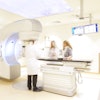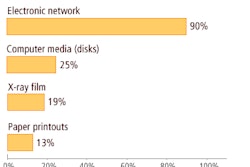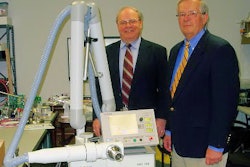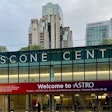U.K. cancer treatment specialists were able to deliver less radiation, in a shorter amount of time, to patients undergoing radiation therapy following breast cancer surgery, according to a study presented at the 2007 American Society of Clinical Oncology (ASCO) in Chicago.
"It is likely that patients can be safely and effectively treated to a lower total dose with fewer fractions," said Dr. John Dewar, a clinical oncologist from the University of Dundee in Dundee, Scotland. The current radiation regimen for women with stage T1-3, N0-1, M0 disease is 50 Gy in 25 fractions over a five-week period, he said.
"We initiated the START trials (Standardisation of Breast Radiotherapy) to see if we could reduce the time to undergo treatment," Dewar said at an ASCO press briefing. The researchers recruited patients from 35 U.K. centers from 1999 to 2002.
For the first phase of the trial (START-A), 2,236 women were divided into three treatment groups: 749 women were treated with the standard regimen, 750 women received 41.6 Gy in 13 fractions of 3.2 Gray over a five-week course, and 737 women received 39 Gy as a total dose in 13 fractions of 3 Gy over five weeks.
In START-B, researchers randomized 2,215 women to receive either the standard dose or 40 Gy in 15 doses over a three-week period. They assigned 1,105 women to the standard therapy and 1,110 women to the reduced level of treatment.
"Cancer control in the breast was very effective in all groups," Dewar said. "About 3.4% of the women had a relapse in the same breast after five years -- less than 1% per year." No statistically significant differences were found among any of the groups in recurrence rates, he said.
"What this means is that we can deliver less radiation in less time and still maintain very effective cancer control," he added.
"This is exciting news for our patients," commented Dr. Julie Gralow, an associate professor of medical oncology at the University of Washington in Seattle. "For many patients who have to travel long distances for treatment the ability to reduce time away from home from five weeks to three weeks is meaningful."
By Ric Susman
AuntMinnie.com contributing writer
June 28, 2007
Related Reading
Breast radiotherapy studies propose shorter treatment, confirm lack of cardiac risk, June 13, 2007
Boost radiotherapy may help prevent relapse of DCIS in young women, July 6, 2006
Radiotherapy can benefit elderly women with early breast cancers, May 17, 2006
Copyright © 2007 AuntMinnie.com



















